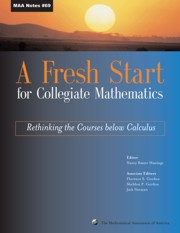Book contents
- Frontmatter
- Preface
- Contents
- Introduction
- Background
- Theme 1 New Visions for Introductory Collegiate Mathematics
- 7 Refocusing Precalculus: Challenges and Questions
- 8 Preparing Students for Calculus in the Twenty-First Century
- 9 Preparing for Calculus and Preparing for Life
- 10 College Algebra: A Course in Crisis
- 11 Changes in College Algebra
- 12 One Approach to Quantitative Literacy: Understanding our Quantitative World
- Theme 2 The Transition from High School to College
- Theme 3 The Needs of Other Disciplines
- Theme 4 Student Learning and Research
- Theme 5 Implementation
- Theme 6 Influencing the Mathematics Community
- Ideas and Projects that Work: Part 1
- Ideas and Projects that Work: Part 2
9 - Preparing for Calculus and Preparing for Life
from Theme 1 - New Visions for Introductory Collegiate Mathematics
- Frontmatter
- Preface
- Contents
- Introduction
- Background
- Theme 1 New Visions for Introductory Collegiate Mathematics
- 7 Refocusing Precalculus: Challenges and Questions
- 8 Preparing Students for Calculus in the Twenty-First Century
- 9 Preparing for Calculus and Preparing for Life
- 10 College Algebra: A Course in Crisis
- 11 Changes in College Algebra
- 12 One Approach to Quantitative Literacy: Understanding our Quantitative World
- Theme 2 The Transition from High School to College
- Theme 3 The Needs of Other Disciplines
- Theme 4 Student Learning and Research
- Theme 5 Implementation
- Theme 6 Influencing the Mathematics Community
- Ideas and Projects that Work: Part 1
- Ideas and Projects that Work: Part 2
Summary
Introduction
Every teacher has been confronted with the question, “Where will I use this?” Very often in school and introductory college mathematics, the answer is, “In calculus.” In fact, preparation for calculus has for several decades been a primary aim of grades 9–12 mathematics. Often this preparation extends to grades 13 or 14. Consequently, calculus has taken on extreme importance and extreme responsibility in US mathematics education. I will argue here that this importance and responsibility are inflated and serve neither calculus nor general education well. Neither students nor the general public see the value that calculus delivers and very few people ever have any use for calculus techniques. The focus on preparation for calculus has narrowed and hurried the mathematics curriculum leaving no time for appreciating or learning to use the mathematics that is taught before calculus. And use of mathematics has become essential in American life, requiring that the aims of grades11-14 mathematics be broadened to include preparation for life.
Calculus: An important role
Calculus is an enormously impressive body of knowledge, a major human intellectual achievement. Developed about 300 years ago, advances in science and engineering due to calculus are endless. The ideas of calculus have been expanded into the major area of mathematical research, analysis, and research results have proven useful in many fields, both within mathematics and in science and engineering. Calculus concepts — limit, derivative, integral, and approximation — are important in many areas of human activity, well beyond those of scientists and engineers.
- Type
- Chapter
- Information
- A Fresh Start for Collegiate MathematicsRethinking the Courses below Calculus, pp. 78 - 82Publisher: Mathematical Association of AmericaPrint publication year: 2006



